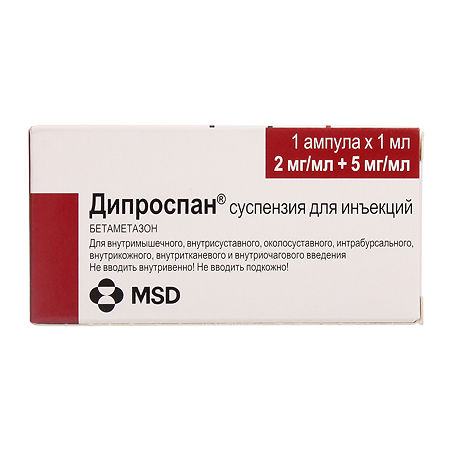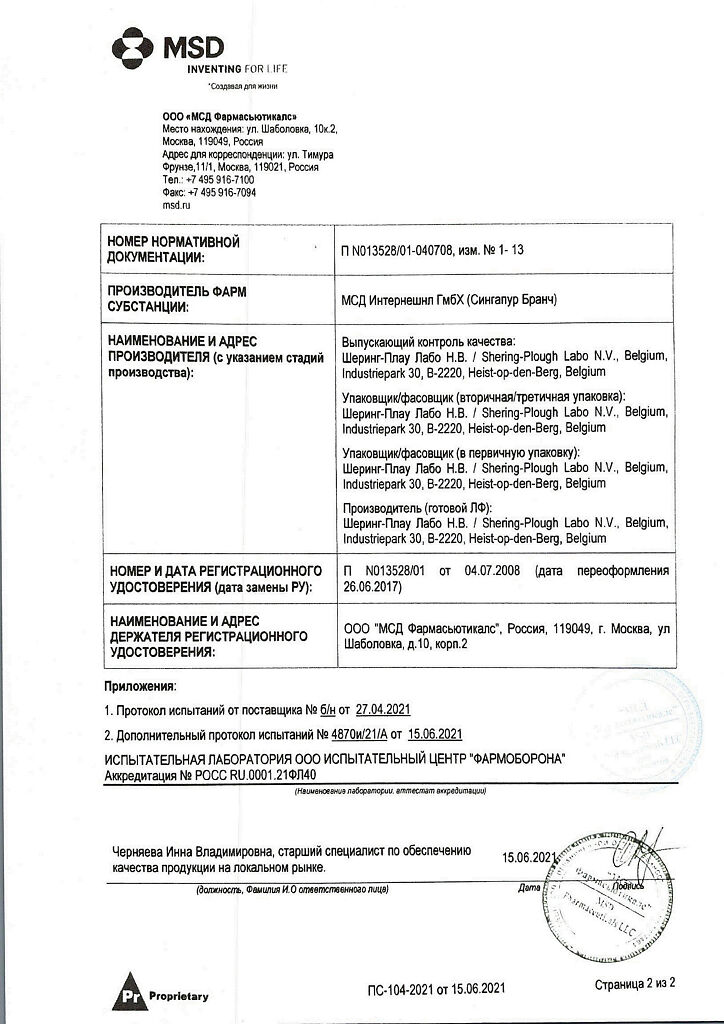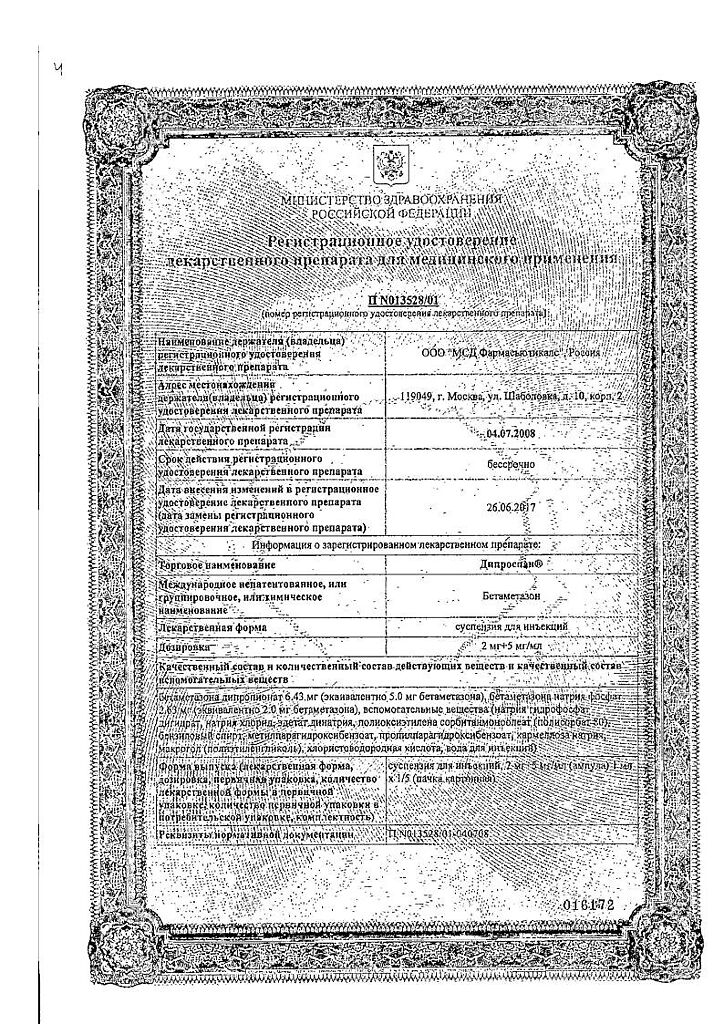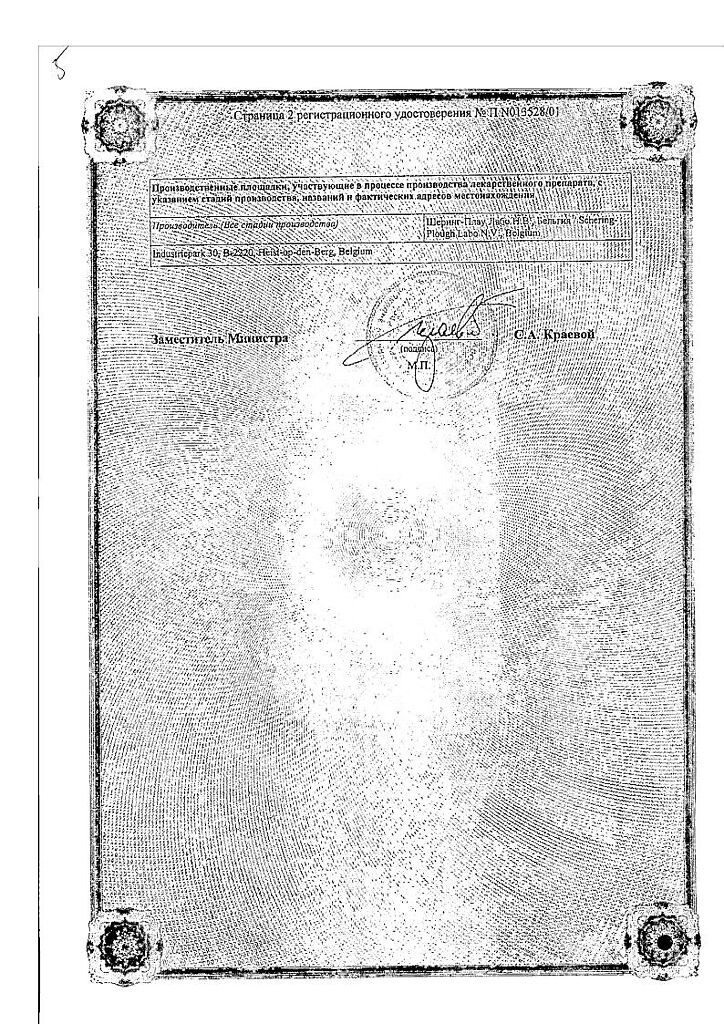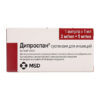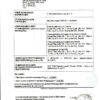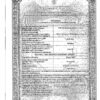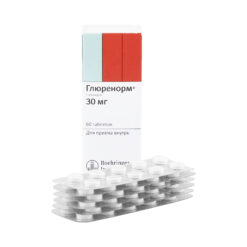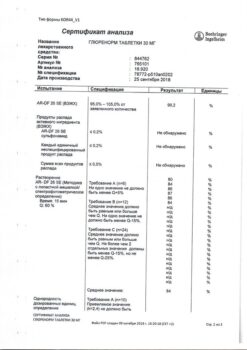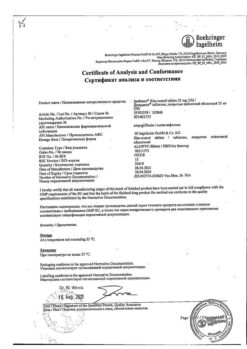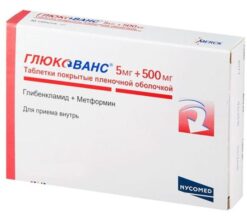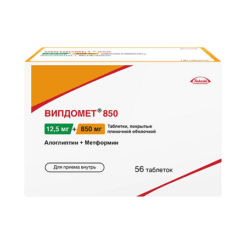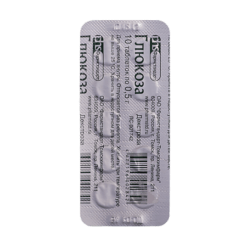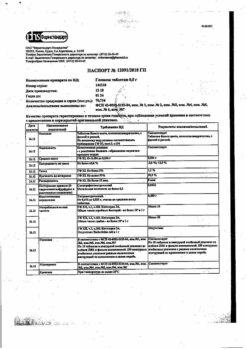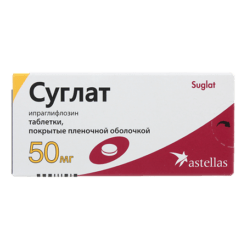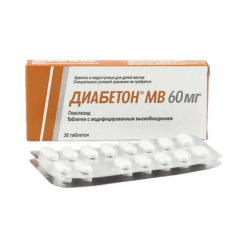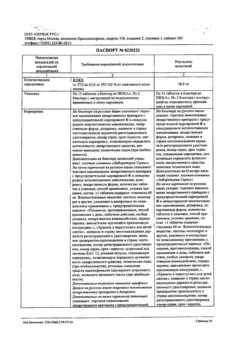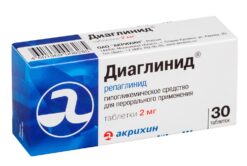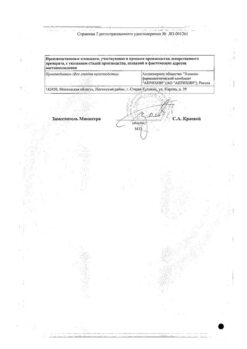No products in the cart.
Dipropan, 2mg+5mg/ml suspension 1 ml
€31.74 €26.45
Description
Dipropan is anti-allergic, anti-inflammatory.
Inhibits release of interleukins 1 and 2, interferon gamma from lymphocytes and macrophages, inflammatory mediators (eosinophils); induces formation of lipocortins; reduces metabolism of arachidonic acid.
Pharmacokinetics
Betamethasone disodium phosphate (easily soluble component) is quickly absorbed and provides rapid onset of effect. Betamethasone dipropionate, which has slower absorption, provides prolonged action.
Indications
Indications
Treatment of conditions and diseases in which GCS therapy allows one to achieve an adequate clinical effect (it must be taken into account that for some diseases GCS therapy is additional and does not replace standard therapy):
Diseases of the musculoskeletal system and soft tissues, incl. rheumatoid arthritis, osteoarthritis, bursitis, ankylosing spondylitis, epicondylitis, radiculitis, coccydynia, sciatica, lumbago, torticollis, ganglion cyst, exostosis, fasciitis, foot diseases;
Allergic diseases, incl. bronchial asthma, hay fever (hay fever), allergic bronchitis, seasonal or year-round rhinitis, drug allergies, serum sickness, reactions to insect bites;
Dermatological diseases, incl. atopic dermatitis, coin-shaped eczema, neurodermatitis, contact dermatitis, severe photodermatitis, urticaria, lichen planus, insulin lipodystrophy, alopecia areata, discoid lupus erythematosus, psoriasis, keloid scars, pemphigus vulgaris, herpetic dermatitis, cystic acne;
Systemic connective tissue diseases, including systemic lupus erythematosus, scleroderma, dermatomyositis, periarteritis nodosa;
Hemoblastoses (palliative therapy of leukemia and lymphomas in adults, acute leukemia in children);
Primary or secondary insufficiency of the adrenal cortex (with mandatory simultaneous use of mineralocorticoids);
Other diseases and pathological conditions requiring treatment with systemic corticosteroids (adrenogenital syndrome, ulcerative colitis, regional ileitis, malabsorption syndrome, damage to the ocular mucosa if it is necessary to administer the drug into the conjunctival sac, pathological changes in the blood if it is necessary to use corticosteroids, nephritis, nephrotic syndrome).
Pharmacological effect
Pharmacological effect
Diprospan – antiallergic, anti-inflammatory.
Inhibits the release of interleukins 1 and 2, interferon gamma from lymphocytes and macrophages, inflammatory mediators (eosinophils); induces the formation of lipocortins; reduces the metabolism of arachidonic acid.
Pharmacokinetics
Betamethasone disodium phosphate (easily soluble component) is rapidly absorbed and provides a rapid onset of effect. Betamethasone dipropionate, which has a slower absorption, provides a prolonged effect.
Special instructions
Special instructions
Administration of the drug into soft tissues, into the lesion and inside the joint can, with a pronounced local effect, simultaneously lead to a systemic effect.
Considering the likelihood of developing anaphylactoid reactions with parenteral administration of GCS, the necessary precautions should be taken before administering the drug, especially if there is a history of allergic reactions to drugs.
Diprospan® contains two active substances – betamethasone compounds, one of which, betamethasone sodium phosphate, is a rapidly soluble fraction and therefore quickly penetrates the systemic circulation. The possible systemic effect of the drug should be taken into account.
When using the drug Diprospan®, mental disorders are possible, especially in patients with emotional instability or a tendency to psychosis.
When prescribing Diprospan to patients with diabetes mellitus, adjustment of hypoglycemic therapy may be required.
Patients receiving Diprospan® in doses that suppress the immune system should be warned about the need to avoid contact with patients with chickenpox and measles (especially important when prescribing the drug to children).
When using the drug Diprospan®, it should be taken into account that GCS can mask the signs of an infectious disease, as well as reduce the body’s resistance to infections.
Prescription of Diprospan for active tuberculosis is possible only in cases of fulminant or disseminated tuberculosis in combination with adequate anti-tuberculosis therapy. When prescribing Diprospan to patients with latent tuberculosis or with a positive reaction to tuberculin, the issue of preventive anti-tuberculosis therapy should be decided. When using rifampin prophylactically, an increase in the hepatic clearance of betamethasone should be taken into account (dose adjustment may be required).
If there is fluid in the joint cavity, a septic process should be excluded.
A noticeable increase in pain, swelling, increased temperature of the surrounding tissues and further limitation of joint mobility indicate infectious arthritis. If the diagnosis is confirmed, antibacterial therapy must be prescribed.
Repeated injections into a joint for osteoarthritis may increase the risk of joint destruction. The introduction of GCS into the tendon tissue gradually leads to tendon rupture.
After successful therapy with intra-articular injections of the drug Diprospan®, the patient should avoid overloading the joint.
Long-term use of corticosteroids can lead to posterior subcapsular cataracts (especially in children), glaucoma with possible damage to the optic nerve and may contribute to the development of secondary eye infections (fungal or viral).
It is necessary to periodically conduct an ophthalmological examination, especially in patients receiving Diprospan® for more than 6 months.
With an increase in blood pressure, fluid and sodium chloride retention in tissues and an increase in potassium excretion from the body (less likely than with the use of other corticosteroids), patients are recommended to follow a diet with limited salt and are additionally prescribed potassium-containing drugs. All corticosteroids enhance calcium excretion.
With the simultaneous use of Diprospan and cardiac glycosides or drugs that affect the electrolyte composition of plasma, monitoring of the water-electrolyte balance is required.
Acetylsalicylic acid is prescribed with caution in combination with the drug Diprospan® for hypoprothrombinemia.
The development of secondary adrenal insufficiency due to too rapid withdrawal of GCS is possible within several months after the end of therapy. If a stressful situation occurs or is threatened during this period, therapy with Diprospan® should be resumed and a mineralocorticoid drug should be prescribed at the same time (due to a possible disruption of mineralocorticoid secretion). Gradual withdrawal of GCS can reduce the risk of developing secondary adrenal insufficiency.
With the use of GCS, changes in sperm motility and number are possible.
During long-term therapy with GCS, it is advisable to consider the possibility of switching from parenteral to oral GCS, taking into account the assessment of the benefit/risk ratio.
Patients receiving GCS should not be vaccinated against smallpox or undergo other immunizations, especially during treatment with GCS in high doses, due to the possibility of developing neurological complications and a low immune response (lack of antibody formation). Immunization is possible during replacement therapy (for example, in case of primary adrenal insufficiency).
Use in pediatrics
Children treated with Diprospan® (especially long-term) should be under close medical supervision for possible growth retardation and the development of secondary adrenal insufficiency.
Active ingredient
Active ingredient
Betamethasone
Composition
Composition
1 ml of suspension contains:
Active substances:
Betamethasone dipropionate 6.43 mg;
Betamethasone sodium phosphate 2.63 mg;
Excipients:
Anhydrous disodium phosphate;
Sodium chloride; trilon B;
Polysorbate 80;
Benzyl alcohol;
Carboxymethylcellulose sodium salt;
Polyethylene glycol 4000;
Nipagin;
Nipazole;
Water for injections.
Pregnancy
Pregnancy
Diprospan is not used during pregnancy.
If it is necessary to use Diprospan during lactation, it is recommended to stop breastfeeding.
Contraindications
Contraindications
Systemic mycoses;
IV or s/c administration;
For intra-articular administration: unstable joint, infectious arthritis;
Injection into infected surfaces and intervertebral space;
Children under 3 years of age (contains benzyl alcohol);
Hypersensitivity to the components of the drug;
Hypersensitivity to other corticosteroids.
With caution:
Parasitic and infectious diseases of a viral, fungal or bacterial nature (currently or recently suffered, including recent contact with a patient) – herpes simplex, herpes zoster (viremic phase), chicken pox, measles; amebiasis, strongyloidiasis (established or suspected); systemic mycosis; active and latent tuberculosis. Use for severe infectious diseases is permissible only against the background of specific therapy.
Post-vaccination period (a period of 8 weeks before and 2 weeks after vaccination), lymphadenitis after BCG vaccination. Immunodeficiency conditions (including AIDS or HIV infection).
Gastrointestinal diseases: gastric and duodenal ulcers, esophagitis, gastritis, acute or latent peptic ulcers, recently created intestinal anastomosis, ulcerative colitis with the threat of perforation or abscess formation, diverticulitis, abscess or other purulent infections.
Diseases of the cardiovascular system, incl. recent myocardial infarction (in patients with acute and subacute myocardial infarction, the necrosis focus may spread, the formation of scar tissue may slow down and, as a result, the heart muscle will rupture), decompensated chronic heart failure, arterial hypertension, hyperlipidemia).
Endocrine diseases – diabetes mellitus (including impaired carbohydrate tolerance), thyrotoxicosis, hypothyroidism, Itsenko-Cushing’s disease.
Severe chronic renal and/or liver failure, nephrourolithiasis, liver cirrhosis.
Thrombocytopenic purpura (im injection).
Hypoalbuminemia and conditions predisposing to its occurrence.
Systemic osteoporosis, myasthenia gravis, acute psychosis, grade III-IV obesity, poliomyelitis (except for the form of bulbar encephalitis), open- and closed-angle glaucoma, eye diseases caused by Herpes simplex (due to the risk of corneal perforation), pregnancy, lactation.
For intra-articular administration: the general serious condition of the patient, the ineffectiveness (or short duration) of the action of 2 previous injections (taking into account the individual properties of the GCS used).
Side Effects
Side Effects
From the central nervous system: sleep disturbances, agitation, depression, anxiety syndrome, polyphagia, neuroses.
Metabolic: weight gain, osteoporosis, growth retardation in children.
Other: secondary infection.
Interaction
Interaction
When prescribing Diprospan® with phenobarbital, rifampin, phenytoin or ephedrine, it is possible to accelerate the metabolism of betamethasone while reducing its therapeutic activity.
When using the drug Diprospan® and indirect anticoagulants together, changes in blood clotting are possible, requiring dose adjustment.
When using Diprospan® together with potassium-sparing diuretics, the likelihood of developing hypokalemia increases.
Diprospan® may enhance potassium excretion caused by amphotericin B.
When using corticosteroids and estrogens simultaneously, dose adjustment may be required (due to the risk of overdose).
The simultaneous use of corticosteroids and cardiac glycosides increases the risk of arrhythmia or digitalis intoxication (due to hypokalemia).
With the combined use of GCS with NSAIDs, with ethanol or ethanol-containing drugs, it is possible to increase the frequency or intensity of erosive and ulcerative lesions of the gastrointestinal tract.
When used together, GCS can reduce the concentration of salicylates in the blood plasma.
Simultaneous administration of GCS and somatotropin can lead to a slower absorption of the latter (administration of betamethasone in doses exceeding 0.3-0.45 mg/m2 of body surface per day should be avoided).
GCS may interfere with the nitrogen blue tetrazole test for bacterial infection and cause a false negative result.
Overdose
Overdose
Symptoms: Acute overdose of betamethasone does not lead to life-threatening situations. Administration of GCS in high doses for several days does not lead to undesirable consequences, except when using very high doses or when used for diabetes mellitus, glaucoma, exacerbation of erosive and ulcerative lesions of the gastrointestinal tract or with the simultaneous use of digitalis preparations, indirect anticoagulants or potassium-sparing diuretics.
Treatment: Careful medical monitoring of the patient’s condition is required. Optimal fluid intake should be maintained and plasma and urinary electrolytes should be monitored, especially the ratio of sodium and potassium ions. If necessary, appropriate therapy should be carried out.
Storage conditions
Storage conditions
In a dark place, at a temperature of 2–25 °C.
Shelf life
Shelf life
3 years.
Manufacturer
Manufacturer
Organon Heist bv, Belgium
Additional information
| Shelf life | 3 years. |
|---|---|
| Conditions of storage | In a dark place at a temperature of 2-25 °C. |
| Manufacturer | Schering-Plough Labo N.V., Belgium |
| Medication form | suspension for injection |
| Brand | Schering-Plough Labo N.V. |
Related products
Buy Dipropan, 2mg+5mg/ml suspension 1 ml with delivery to USA, UK, Europe and over 120 other countries.

